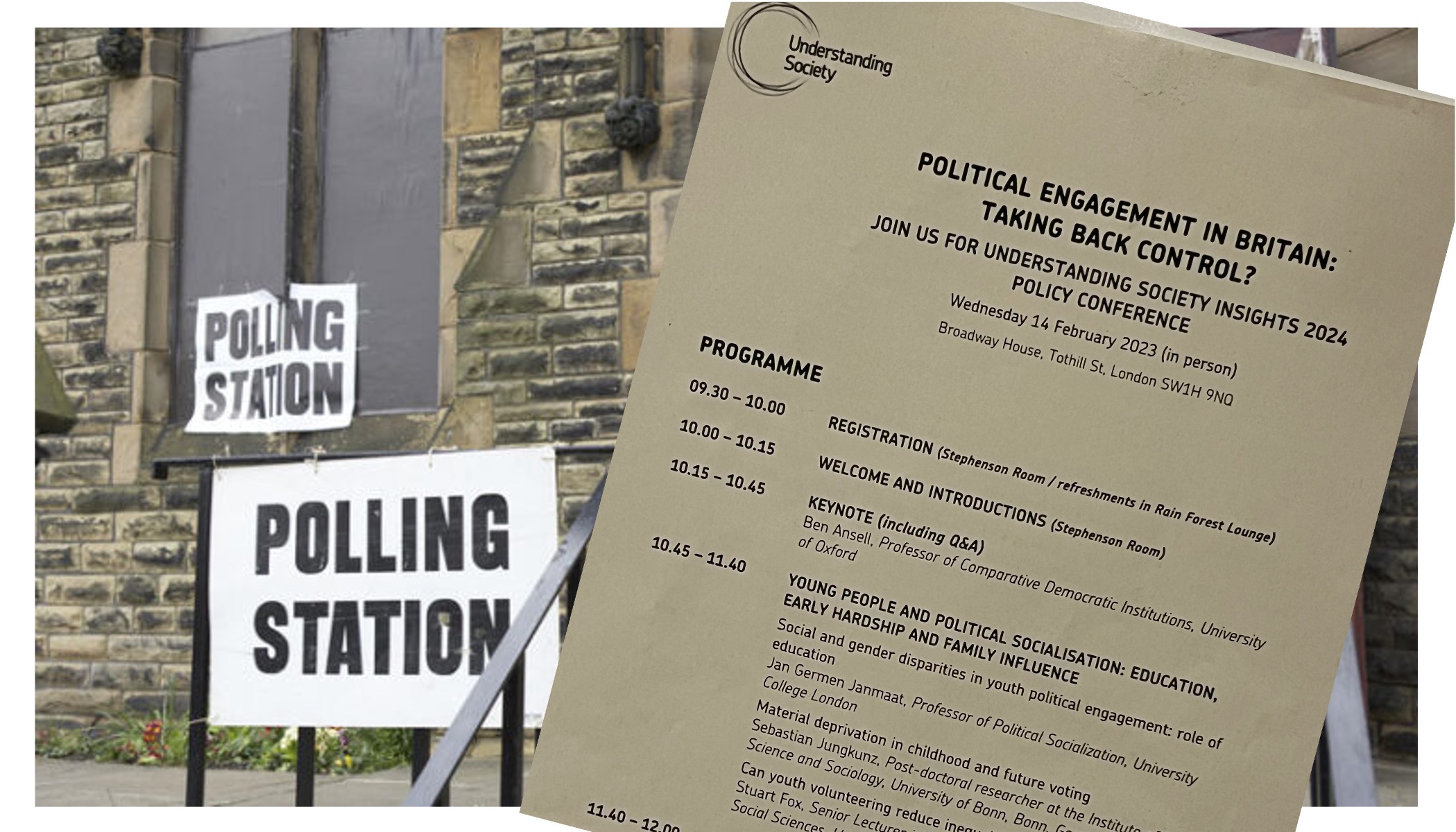This is Blog No 60
This was the theme of a University of Essex conference this week in London. Based on its long-standing ‘Understanding Society’ research, it was focused on Political engagement in Britain, and brought together an impressive gathering of academics to discuss the latest data and thinking on an important subject for mature democracies.

With a General Election coming soon, and long-standing concerns about voter turnout, the issue is topical, and we heard a range of useful insights. Oxford Professor Ben Ansell, who delivered the BBC Reith lectures in 2023 challenged the right-wing analysis that the body politic has been taken over by a graduate liberal elite that is out of touch with the ‘silent majority’. Still a highly contentious issue!
There is a lot of research about voting – how older generations more frequently go to the polls. How economic deprivation discourages people from political involvement (Georgios Chrysanthou of the University of Dundee). How the political engagement of those UK citizens that are foreign-born is more influenced by their immigration experience (eg the welcome they received) than by other factors (Prof Renee Luthra of University of Essex). The importance of parental education in youth political participation; (Prof Jan Germen Janmaat, UC London) And how BREXIT has demolished many of the traditional demographic behaviour patterns; (Prof Tak Wing Chan, UCL London)
But of course, there is more to political participation than voting. Stuart Fox from the University of Exeter has been studying the practice of volunteering – in search of clues as to whether there are different dynamics affecting the propensity to participate in civil society. A research fellow from Milan – Franco Bezzo was able to confirm what many of us instinctively know – that living in socially deprived areas reduces your likely civil or civic participation.
In democratic terms, inequality isn’t just about how many Cabinet Ministers went to Eton; it is the bias that creeps into public policy decisions at all levels. For those of us accustomed to asking the excellent question, ‘Who is in the room?’, too many choices are made by unrepresentative organisations and individuals. A key rationale for consultation is to help redress the balance by gathering a wider range of voices so that more stakeholder opinions can be injected into a debate before decisions are made.
This matters. That is because the services that society eventually pays for tend to reflect the balance of those who participate. The most obvious example – amply proven by the Essex conference is that because older people are more likely to vote, policies that favour their generation have received priority over those that help young people. That, in turn adds to the disillusion of youth which further reduces their propensity to participate, reinforcing the vicious circle and the decline in their public involvement.
Ever since we started the Consultation Institute in 2003, my colleagues and I met professional civil servants and local government officers passionately anxious to attract more young people to respond to consultations. It is not easy, but it can be done. It needs commitment, ingenuity, and a willingness to use new methods. In a nutshell, we have to go to them, rather than expect them to come to us. The digital world holds many opportunities to connect, and by focusing on social media tools, practical co-production and other ways of involvement, their voices can certainly be heard.
Inequality in service provision reflects inequality of representation.
For one of the best analyses I have recently examined, look at recent work undertaken by the NHS in Bedford, Luton, and Milton Keynes.
The Denny Review takes its name from a local clergyman who spearheaded the project that was partly inspired by the 75th anniversary of the Windrush immigration. It sought to identify health inequalities in an otherwise prosperous part of the south of England. Using the voluntary sector and Healthwatch to interview large numbers of those with demonstrably worse health outcomes, the research highlights the weaknesses manifestly evident in the current NHS approach to its public and patients. It highlights so many working practices, biases and unthinking unfairnesses that affect groups that society neglects.
High on the list of those that are most neglected are the Roma community. It considers West African women, Bangladeshi families, homeless people, those with mental health or learning difficulties.

It finds common problems – many involving matters of literacy that affect people’s access to healthcare. It identifies a huge gap in cultural awareness and a lack of empathy among many front-line staff like GP receptionists. Its detailed recommendations are well thought-through and should provide a useful checklist for many working in health and social care.
No doubt there are similar initiatives worth studying, so there is room for optimism. Political academics, I suspect, miss much of this grassroots activity. They are still seeing too few signs of any upsurge in political engagement. But maybe we need to look beyond the ballot box and recognise that a modern democracy complements its occasional visits to the polling stations with multi-media, multi-channel supplementary tools of political accountability. Surely that is what Citizens’ Assemblies, Participatory Budgeting, Co-production and all the other innovative forms of consultation and engagement are all about? Public and stakeholder consultations are also key elements in the wider political engagement mix.
I came away from the Essex University conference worrying about the mountain we have to climb to re-balance the profile of public engagement. Then I read the Denny Report and concluded that there are good people who have mapped out some feasible routes upwards - and they are on their way …
Rhion H Jones LL.B
See Rhion's Speeches etc - click here
For More like this - free of charge: now click here